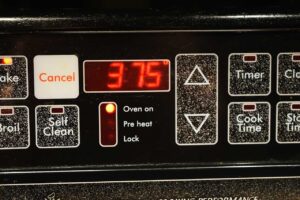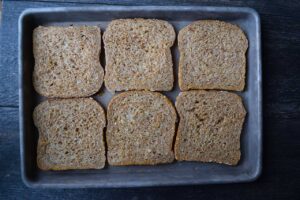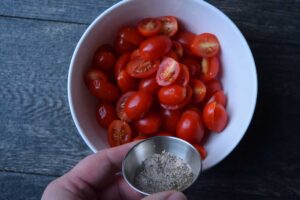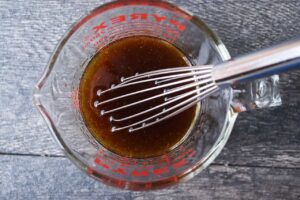Panzanella Recipe
This post may contain affiliate links. If you make a purchase through links on this site, I may earn a commission.
Read my Privacy Policy.
If you’ve never tried Panzanella before, you are truly missing out. It’s a delicious salad the whole family will beg for again and again.
This Tuscan dish should really be more of a thing here in the States. It’s a great way to use up stale bread, meaning you’ll have less food waste and save money while enjoying a hearty, healthy, and delicious meal.
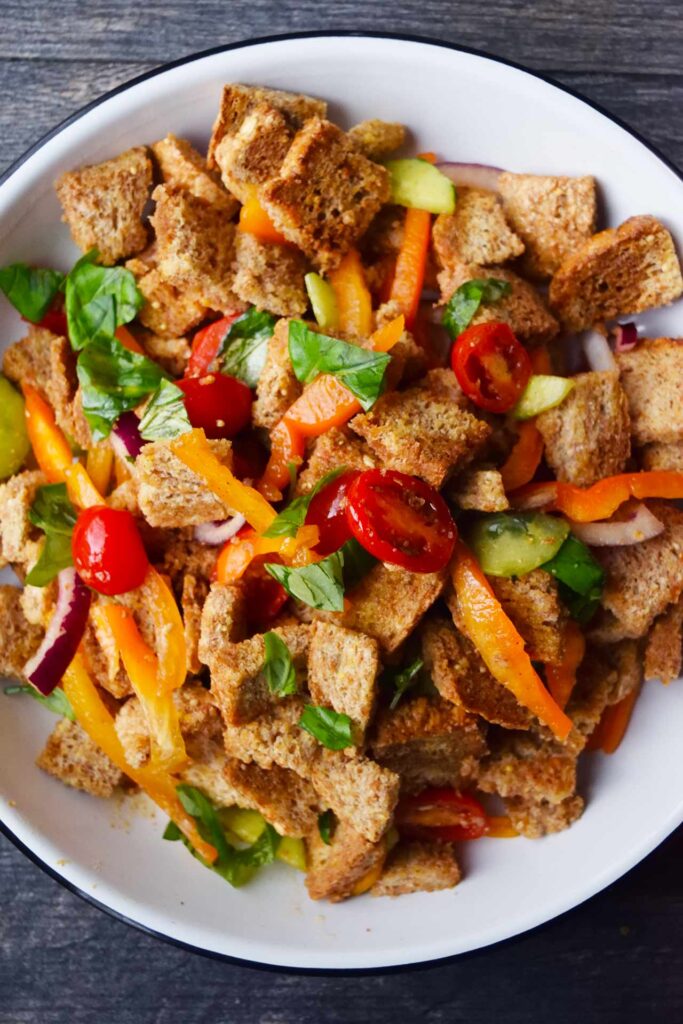
What Is Panzanella
Panzanella is a Tuscan dish. It’s made with stale bread, tomatoes, onions, cucumbers, basil, and, on occasion, extra additions such as bell pepper or capers. Traditional methods often include soaking the bread in water and then squeezing it out. But these days, most people skip this step because you get more flavor from the salad if you don’t do this, and I’m all about flavor. So, I skipped this step altogether. The salad is topped with a vinaigrette of your choosing. While the recipe here calls for a very basic, simple vinaigrette, you can use whichever vinaigrette you prefer.
What Does Panzanella Mean In Italian?
“Panzanella” is actually a combination of two Italian words. “Pane,” which means bread, and “Zanella,” which refers to a deep bowl or plate. So the two words put together give you a translation of “bread in a small basket,” or better yet, “bread salad,” which is exactly what this is.
Dry Bread Versus Stale Bread: Which is Better in Panzanella Salad?
First, we should look at what the two distinctions actually mean. While both types of bread have their place in cooking, there are a few key differences.
- Dry Bread – This is bread that has been toasted or dried out, typically using heat. Drying bread is what gives you that crunchy texture you find in toast. You can also bake bread slices to dry them out. Dry bread is not as great at soaking up moisture.
- Stale Bread – Stale bread, on the other hand, is bread that has naturally lost moisture over time through exposure to air. So basically, it’s bread that has been left out and, because of this, has hardened a bit, or “toughened up.” It has a firm texture, and you are less likely to want to eat it. That said, bread can also become stale in the fridge. Stale bread is much better at soaking up moisture and is, therefore, a better option for making Panzanella because it will soak up the dressing, giving your salad plenty of flavor. In a pinch, opt for day-old bread.
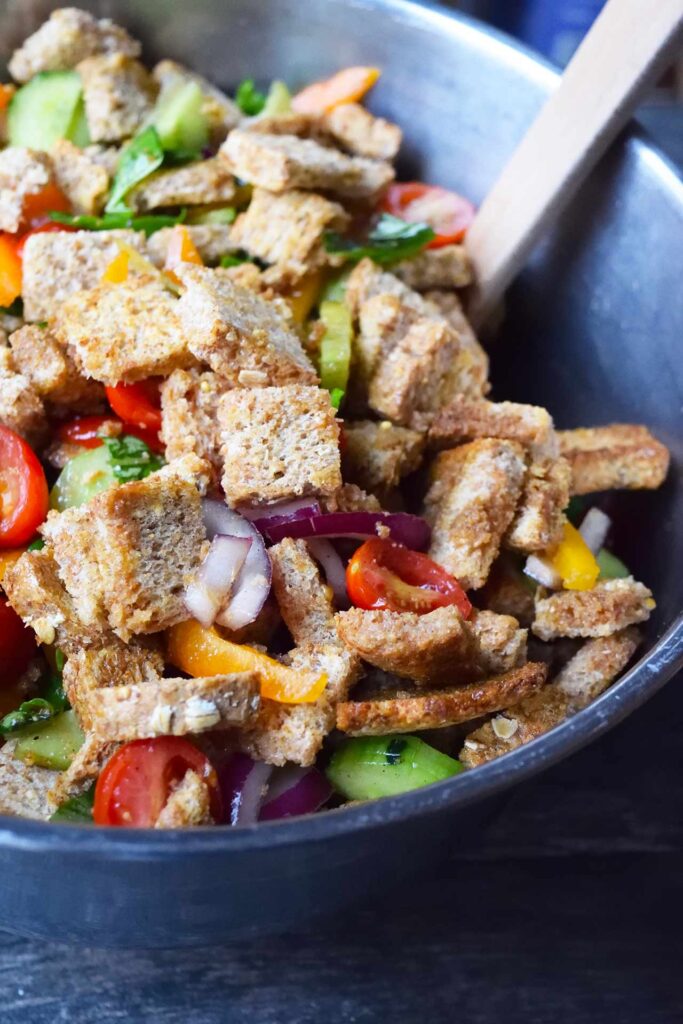
Salting Your Tomatoes
For this salad, you’ll get even better flavor if you salt your tomatoes. I took this a step further and also peppered my tomatoes. I love tomatoes with salt and pepper and often make a meal of just that in summer. But for this recipe, you’ll at least want to sprinkle salt over your tomatoes and let them sit for about a minute or so before adding them to your salad.
Vinaigrette For Panzanella
I have found that the best vinaigrette for this Italian bread salad is often the simplest vinaigrette. You don’t have to go crazy here. If you want to use a flavored vinaigrette, you can certainly do so. But in my opinion, the flavors shine through the most when you keep things simple.
Bread For Panzanella
You’re probably wondering what the best bread is to use for Panzanella. The obvious choice for the average person is a rustic loaf of Italian bread. However, for the purposes of making this healthier and fitting in with Mediterranean diet requirements, I used 100% whole wheat bread with no added sugar. At the end of the day, the bread that works best is the bread you like. This Panzanella salad is pretty forgiving, so while your choice of bread matters, it’s not the end of the world if you don’t stick to more traditional loaves of bread, which usually include white, processed flour.
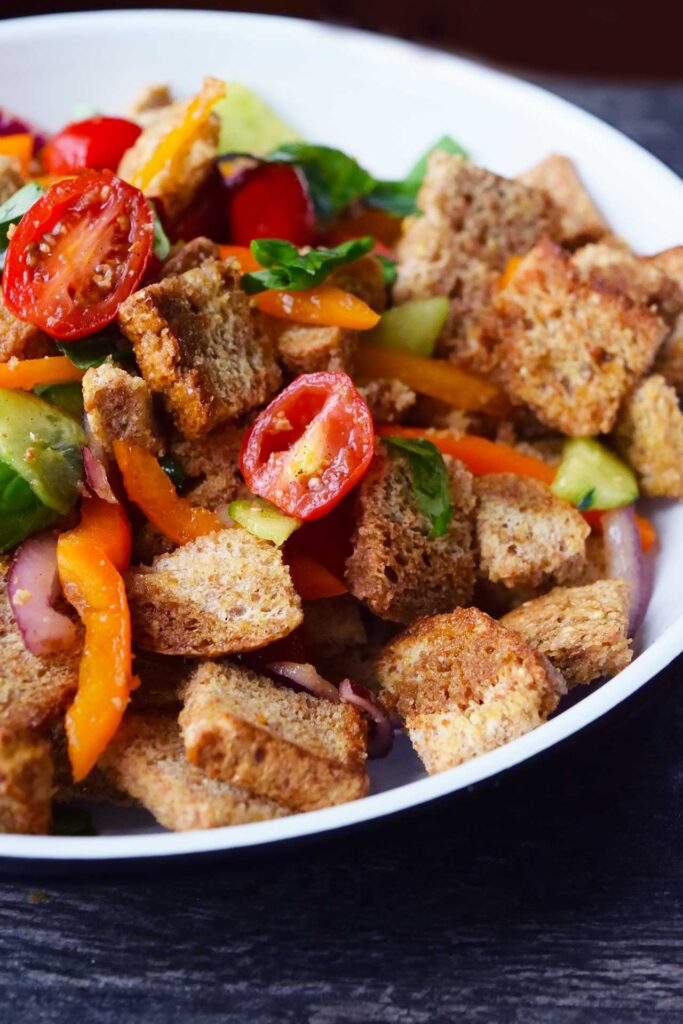
What To Serve With Panzanella
While you could certainly serve Panzanella on its own, some of you will want to round out the meal a bit more. If that’s you, here are some suggestions for dishes that pair well with Panzanella.
- Grilled or Roasted Meats – Grilled chicken, steak, fish, shrimp, or any other roasted meats are all great choices here.
- Soups – Minestrone, tomato basil soup, or vegetable soup go great with Panzanella. After all, soup and salad are a pretty classic combo.
- Cheese and/or Charcuterie Platter – For something a little more light and breezy, you can serve this salad with a cheese platter or charcuterie board. Think: Different cheeses, meats, olives, and other antipasto foods.
How To Add More Robust Flavor To Panzanella
If you aren’t a fan of simpler flavors, you can certainly level up any Panzanella recipe by adding one or more of the following:
- Garlic – Crush a clove or two of garlic and mix it with the dressing.
- Herbs – Besides basil, you can add other fresh herbs like parsley, oregano, or thyme.
- Avocado – Cut into chunks.
- Cheese – Consider adding crumbled feta cheese, fresh mozzarella, or shaved Parmesan.
- Capers or Olives – You don’t need a lot. A little goes a long way in this salad.
- Grilled Vegetables – Grilled zucchini, eggplant, or artichoke hearts.
- Roasted Garlic – Blend roasted garlic into the dressing using a blender for the best results.
- Balsamic Glaze – This can be added in place of, or in addition to, the vinaigrette called for in the recipe.
- Toasted Nuts or Seeds – Toasted pine nuts, almonds, or sunflower seeds add flavor, texture, and good nutrition.
- Fresh Fruit – Make it seasonal. Try apples, peaches, cherries, and more.
- Dijon Mustard: Add about a teaspoon to the dressing to punch up the flavor a bit.

Making Panzanella For The Seasons
Spring Panzanella Salad
Spring gives us so many options for adding to this salad. Great combinations for spring include cherry tomatoes, cucumbers, radishes, asparagus spears, chives, parsley and even mint. Try using a lemon vinaigrette with a touch of honey
Summer Panzanella Salad
Summer is the best time of year to make Panzanella. Try using heirloom tomatoes, corn, bell peppers, and fresh basil leaves. Make a balsamic reduction, then mix it with extra-virgin olive oil for your dressing.
Autumn Panzanella Salad
Fall gives us some unique and tasty options for making this salad. Try adding roasted butternut squash chunks, caramelized onions, roasted beets, and even some apple slices. Mix in toasted walnuts or pecans, and try using apple cider vinegar with some maple syrup when making your vinaigrette.
Winter Panzanella Salad
Just because it’s winter doesn’t mean you can’t make a delicious Panzanella. Use seasonal produce such as roasted Brussels sprouts, roasted root vegetables such as carrots and parsnips, or any other winter squash you’d like to use. Add pomegranate arils and maybe some apples for a touch of sweetness. For dressing, try adding some rosemary and thyme to your vinaigrette, along with a touch of Dijon mustard.
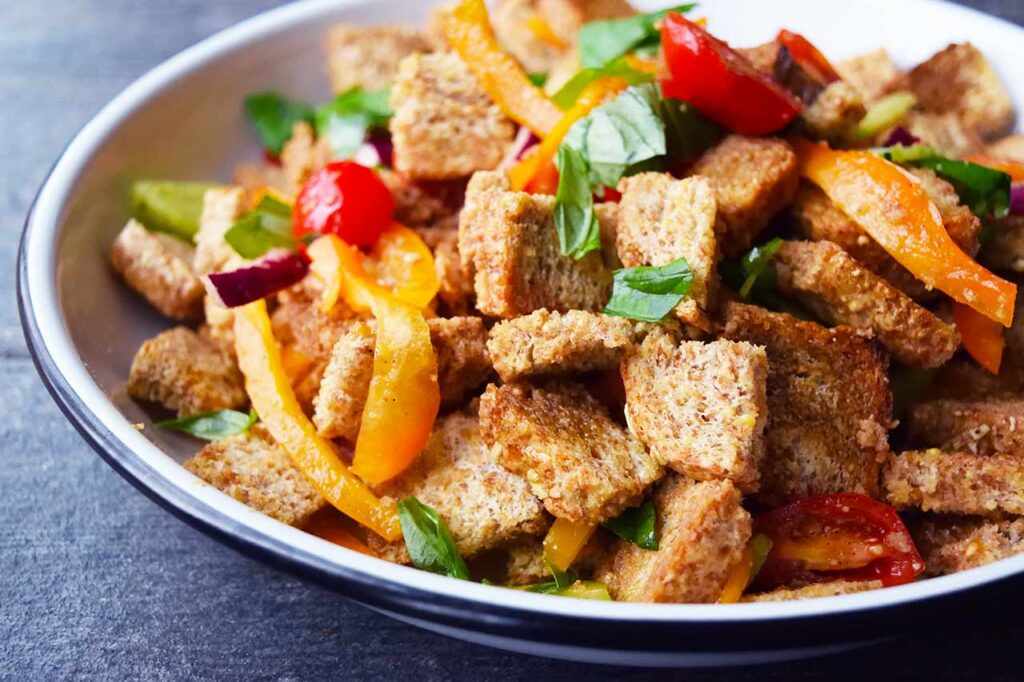
Recipe Tip
One tip I will give you for making a really good Panzanella is to make sure you cut the bread into small enough cubes. I cut mine a little large, and it made the overall texture not quite as enjoyable. Cut them as small as you can. Like a small salad crouton. You want small, bite-size pieces.
What Is Panzanella Made Of?
Bread – See notes above for the best type to use. Cut your stale bread into bite-sized cubes.
Tomatoes – While this recipe calls for grape tomatoes, you can use larger tomatoes if. you wish. Just cut them into chunks.
Red onion – You can slice this or chop it, but I find that the classic version, which uses slices, gives the best overall texture. The choice is yours.
Cucumber – It’s up to you if you peel it or not.
Bell pepper – While red bell peppers give the best flavor overall, you can use any color of pepper you choose. I used an orange bell pepper for this because it’s what I had on hand.
Fresh basil leaves – Soak the fresh basil when you get it home to remove any dirt or debris. Dry it well, and then you can either chop it or simply tear the leaves by hand. I like to cut mine into ribbons.
Extra-virgin olive oil – Use the best quality oil you can afford.
Balsamic vinegar – You can use red wine vinegar here if you prefer that. I just love balsamic, so that’s what I used.
Salt and freshly ground black pepper – To taste and also to season the tomatoes with.
How To Make Panzanella
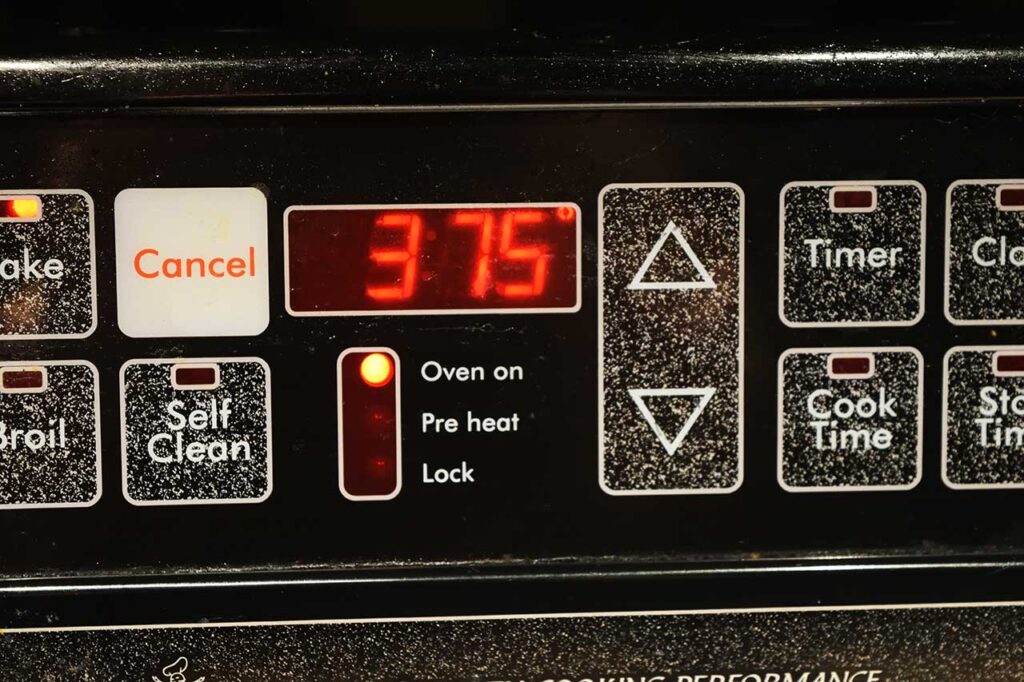
Preheat the oven to 375°F (190°C).
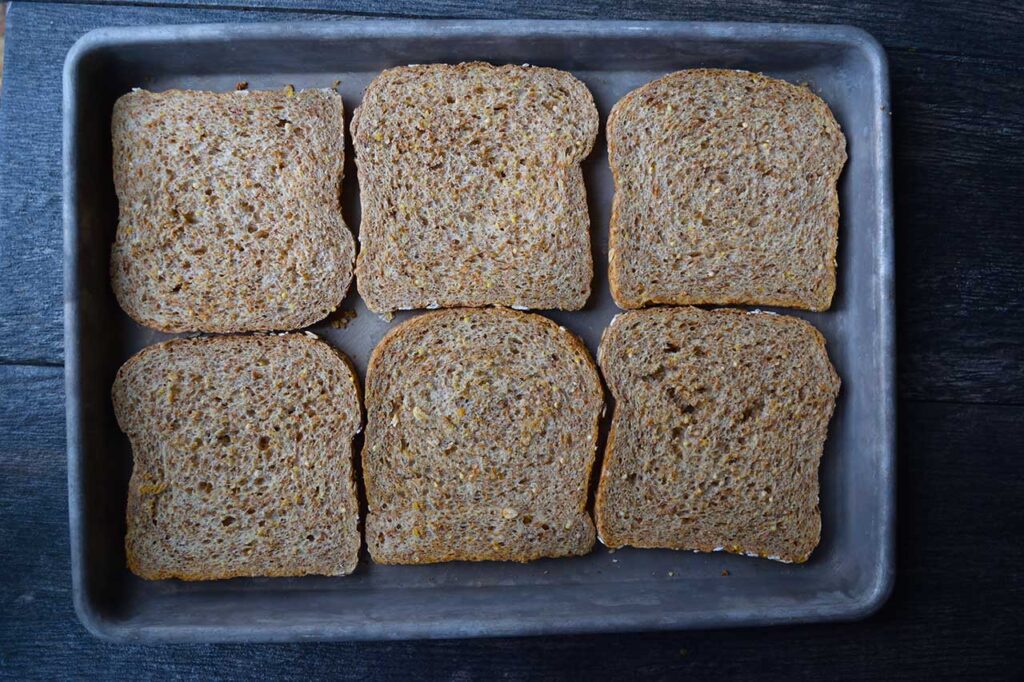
Lay out the bread slices on a baking sheet. Bake for 10-15 minutes or until they are toasted to your liking. Flip at the halfway mark. Don’t let them get too crunchy, or they get difficult to eat.
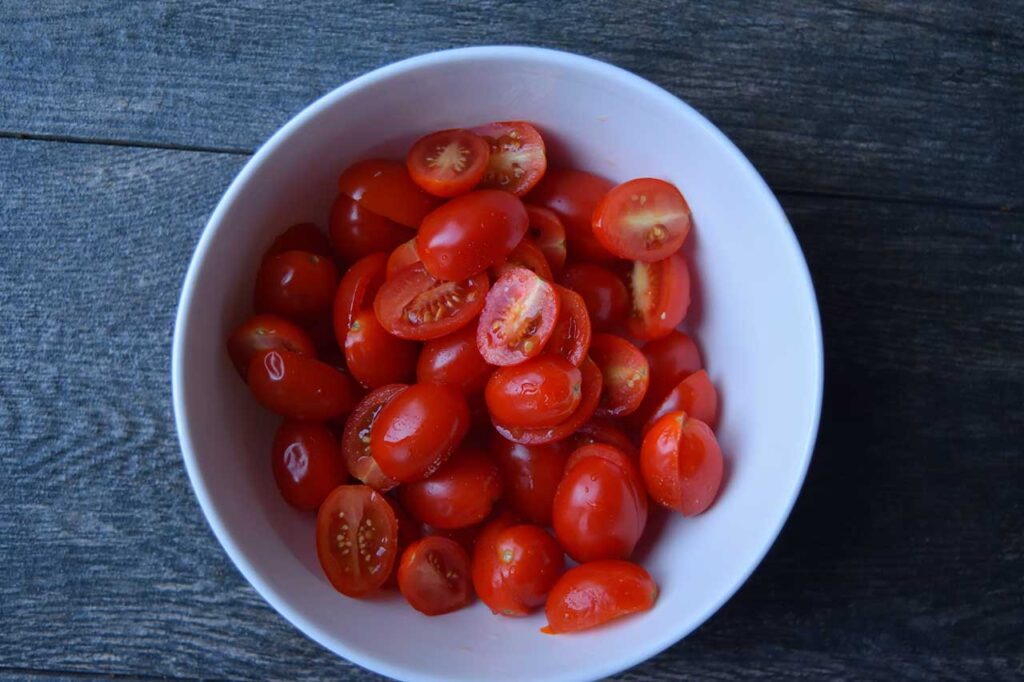
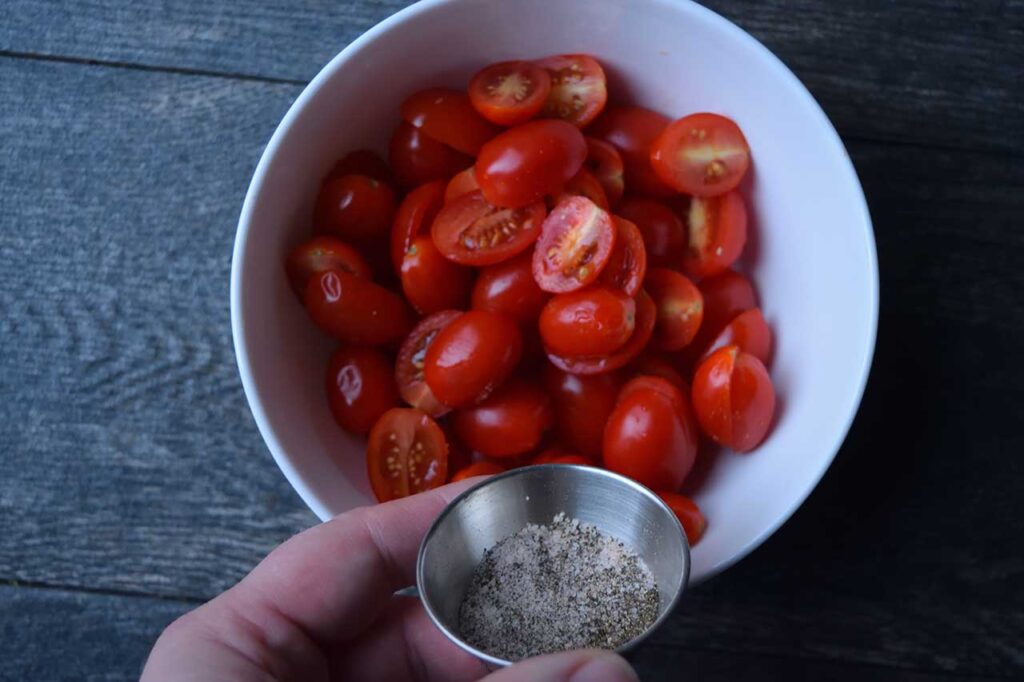
While the bread is toasting, cut the tomatoes as needed and salt and pepper them. Let them sit until you are done with the rest of your prep.
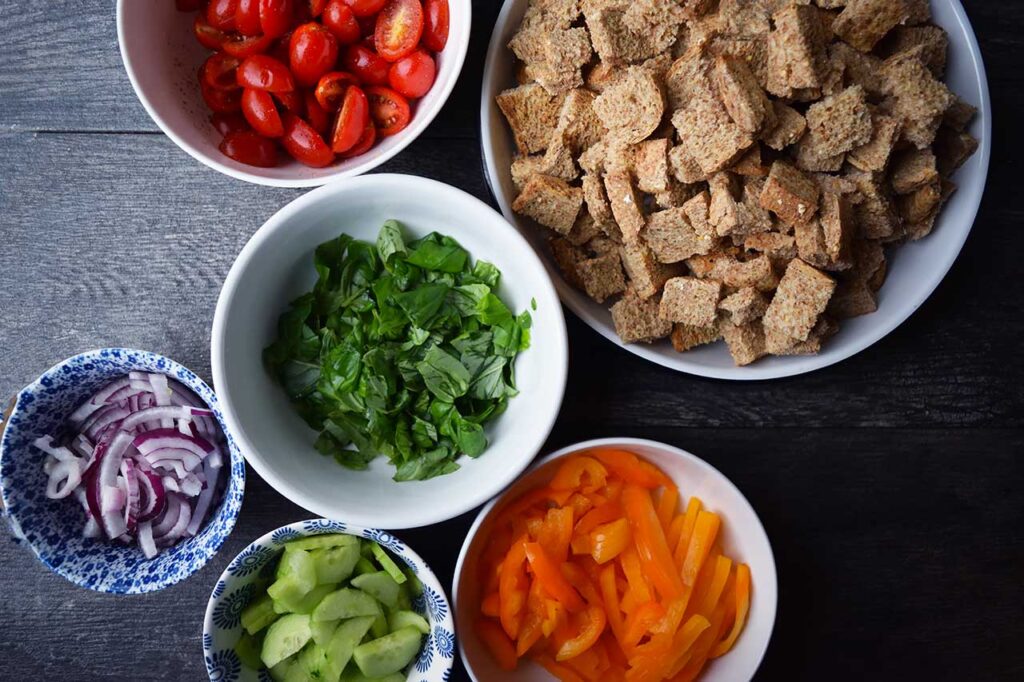
Cut the toasted slices into small cubes and prep the remaining ingredients as well.
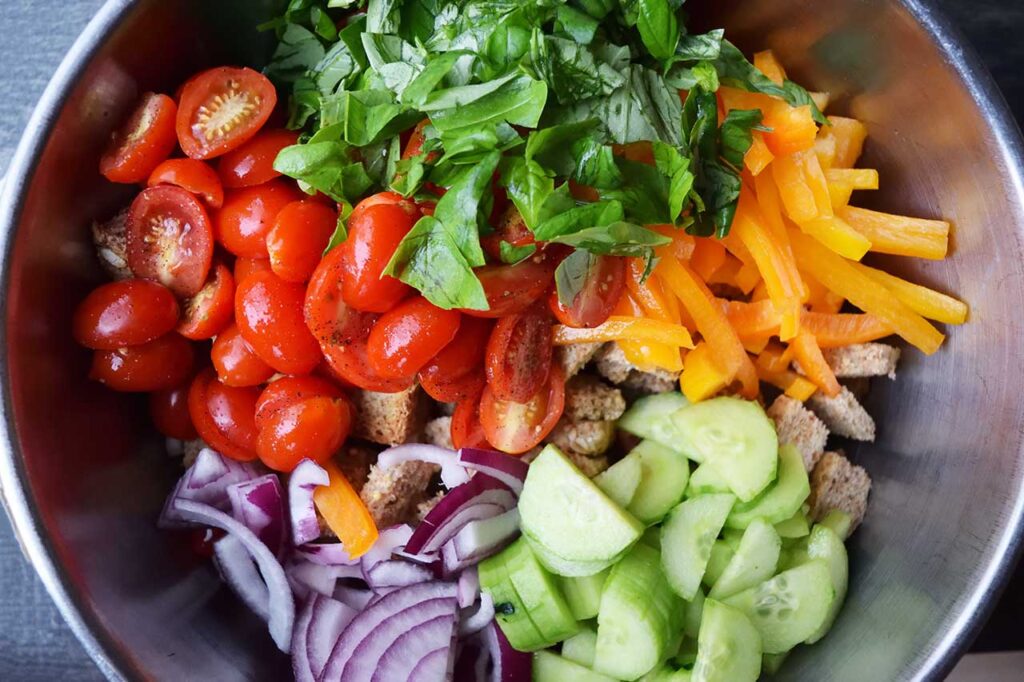
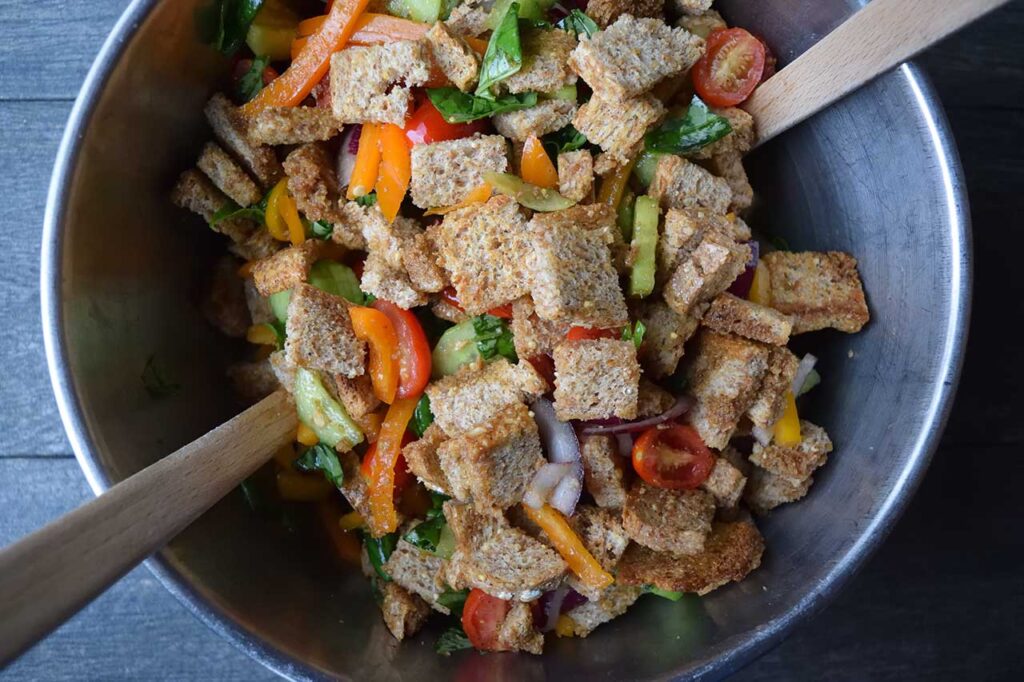
To a large mixing bowl, add all the salad ingredients. Toss well to combine.
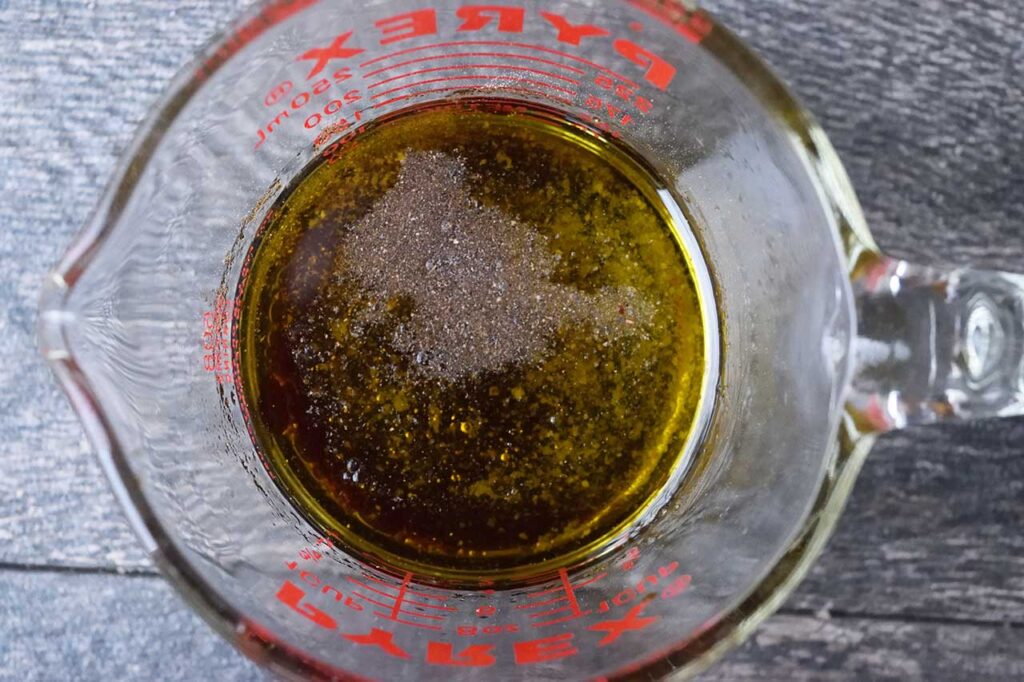
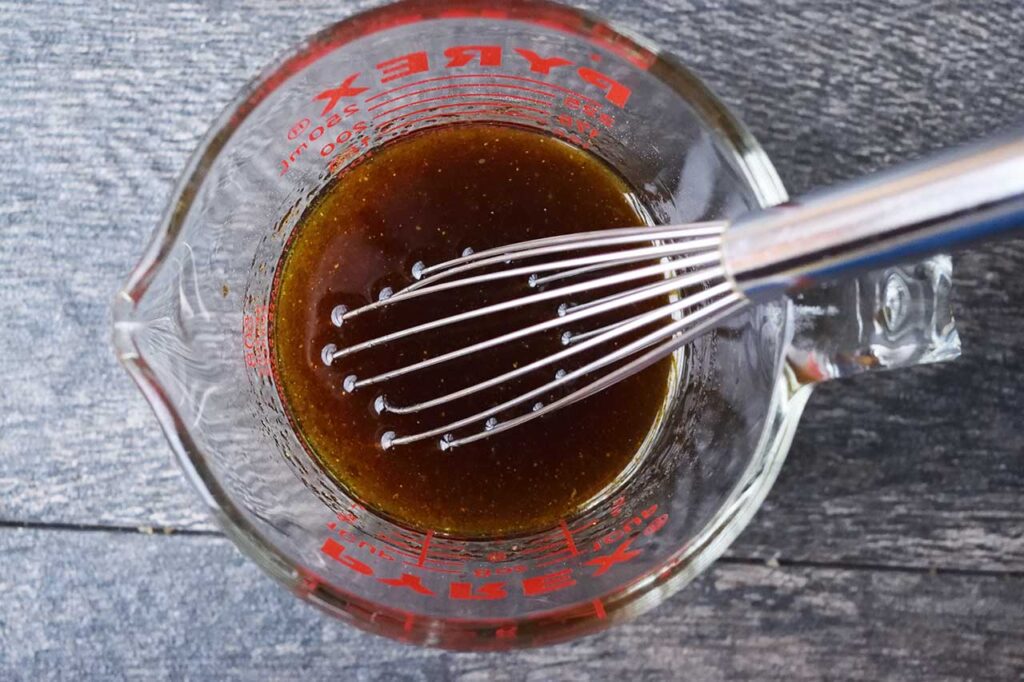
In a separate small bowl, whisk together the extra-virgin olive oil, red wine vinegar, salt, and black pepper to make the dressing.
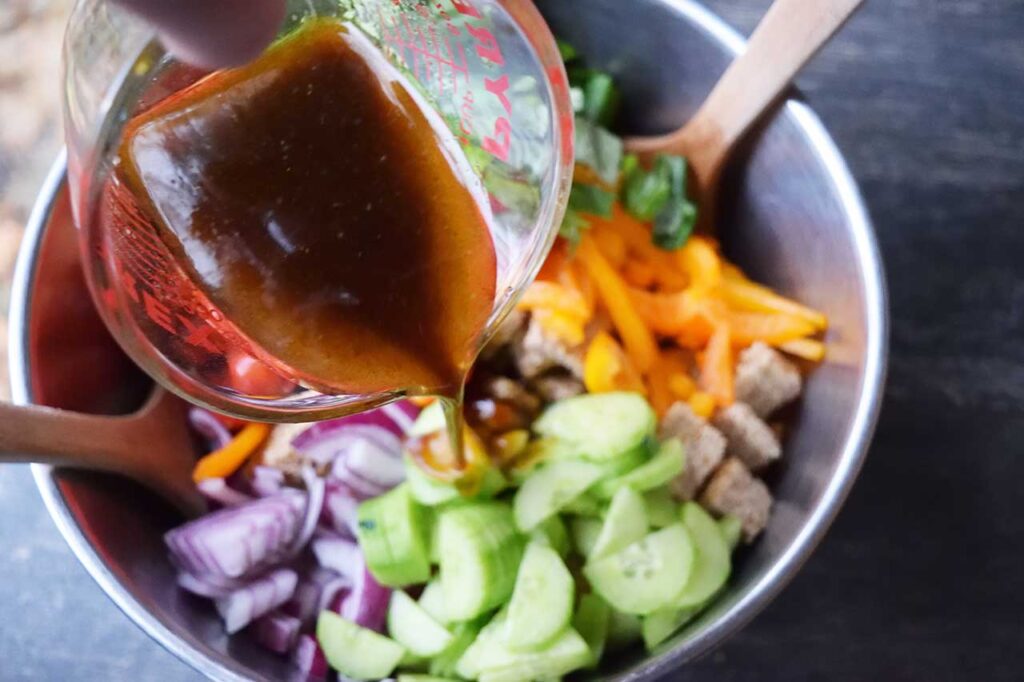
Pour the dressing over the bread and vegetable mixture. Gently toss everything together until the bread cubes are coated with the dressing and the ingredients are well combined.
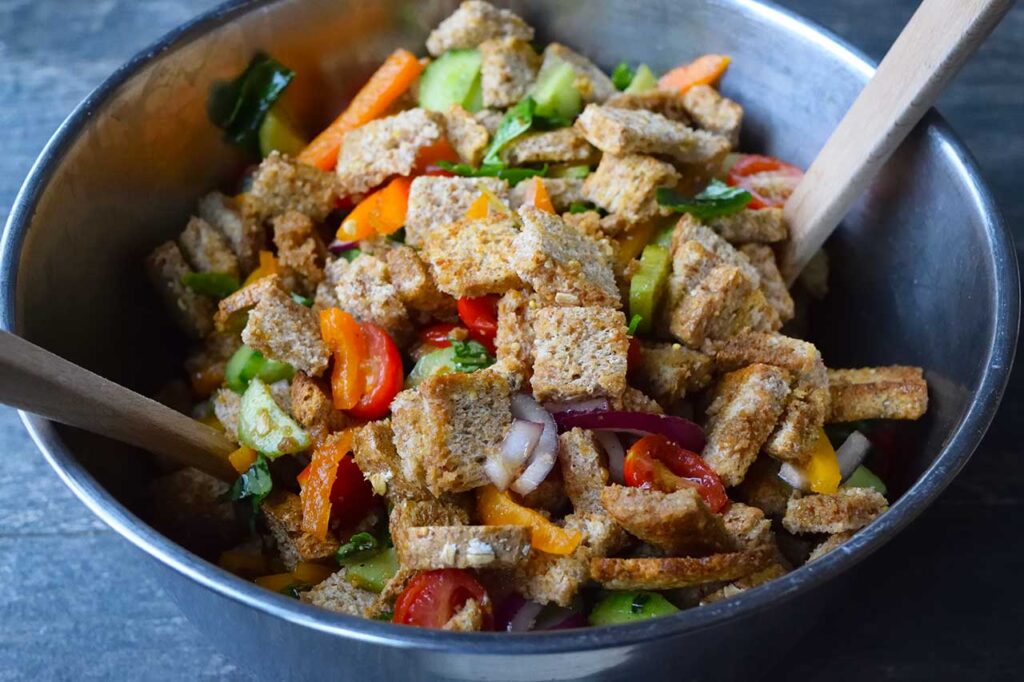
Allow the Panzanella salad to sit for about 15-20 minutes before serving. This allows the flavors to meld together.
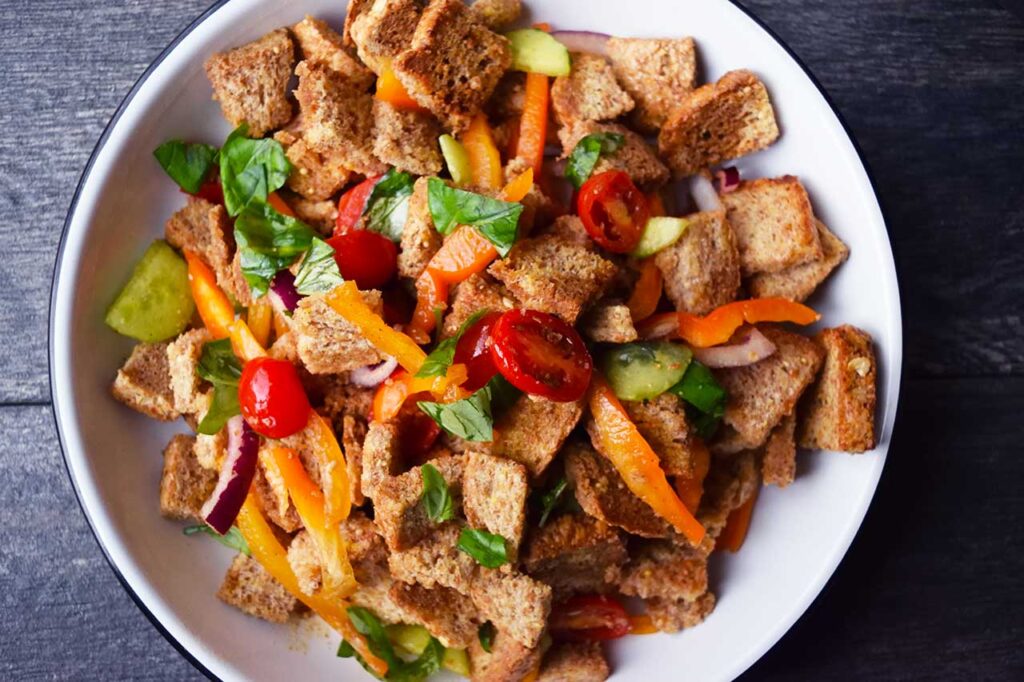
Taste and adjust seasoning if necessary before serving. Garnish with additional fresh basil leaves if desired.
Storage
Refrigerating Leftover Panzanella:
- Transfer the leftover Panzanella salad into an airtight container or a bowl tightly covered with plastic wrap.
- Place the container in the refrigerator promptly, preferably within 2 hours of preparation.
- Properly stored, Panzanella can last in the refrigerator for up to 2-3 days. However, keep in mind that the longer it sits, the soggier the bread might become due to absorbing moisture from the vegetables and dressing.
Freezing
Freezing Leftover Panzanella: Panzanella doesn’t freeze particularly well due to the bread becoming mushy when thawed. However, if you’re willing to accept the change in texture, here’s how you can freeze it:
- Place the leftover Panzanella in an airtight container or freezer-safe bag.
- Ensure that the container is sealed tightly to minimize exposure to air.
- Label the container with the date to track its freshness.
- Panzanella can be frozen for up to 1-2 months.
Reheating
Reheating Panzanella (if desired): Reheating Panzanella can further soften the bread, altering its texture. However, if you’d still like to reheat it:
- Preheat the oven to a low temperature, around 250°F (120°C).
- Spread the leftover Panzanella on a baking sheet in a single layer to allow even heating.
- Warm it in the oven for approximately 10-15 minutes, checking occasionally to prevent the bread from becoming too crispy or dried out.
- Remove from the oven once warmed through, and serve immediately.
Storage Tips
- Avoid freezing Panzanella if possible, as the texture of the bread may change significantly upon thawing.
- Consider storing the dressing separately from the salad if you anticipate having leftovers. Add the dressing just before serving to prevent the bread from becoming excessively soggy.
Remember that Panzanella is best enjoyed fresh, so it’s ideal to prepare it in smaller batches to minimize leftovers. Additionally, adjust the quantity of bread you use based on how much you expect to consume to avoid excessive sogginess when storing leftovers.
More Bread Recipes
SUBSCRIBE
Remember to subscribe to my free newsletter to receive all my latest recipes in your inbox. Click here to sign up!
Panzanella Recipe Card

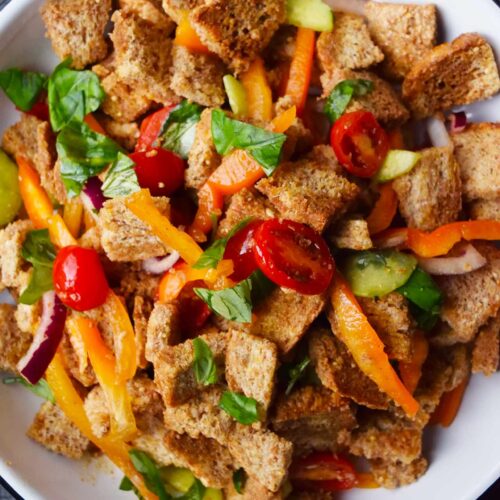
Panzanella Recipe
Ingredients
Salad
- 8 slices whole grain bread (whole grain, rustic Italian, or country-style bread)
- 1 pint grape tomatoes (halved)
- 1 cup red onion (thinly sliced)
- 1 cup cucumber slices (halved)
- 1 medium bell pepper (chopped – any color you prefer)
- 1 cup loosely packed fresh basil leaves (torn)
Dressing
- ⅔ cup extra virgin olive oil
- 6 tbsp. balsamic vinegar
- salt and ground black pepper (to taste)
Instructions
- Preheat the oven to 375°F (190°C).

- Lay out the bread slices on a baking sheet. Bake for 10-15 minutes or until they are toasted to your liking. Flip at the halfway mark. Don't let them get too crunchy, or they get difficult to eat.

- While the bread is toasting, cut the tomatoes as needed and salt and pepper them. Let them sit until you are done with the rest of your prep.

- Cut the toasted slices into small cubes and prep the remaining ingredients as well.

- To a large mixing bowl, add all the salad ingredients. Toss well to combine.

- In a separate small bowl, whisk together the extra-virgin olive oil, red wine vinegar, salt, and black pepper to make the dressing.

- Pour the dressing over the bread and vegetable mixture. Gently toss everything together until the bread cubes are coated with the dressing and the ingredients are well combined.

- Allow the Panzanella salad to sit for about 15-20 minutes before serving. This allows the flavors to meld together.

- Taste and adjust seasoning if necessary before serving. Garnish with additional fresh basil leaves if desired.


